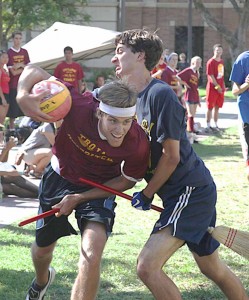New USC program seeks its own niche
The latest sports craze taking the world by storm really does not seem all that complicated to the untrained eye — you run around with a broom between your legs and throw a ball through some hoops.

In flight · USC, which is ranked No. 22 in the world by the International Quidditch Association, faced UCLA on Sunday outside Marks Hall. - Ralf Cheung | Daily Trojan
It’s simple enough that even a Muggle can play it. The sport, of course, is quidditch, the magical sport of J.K. Rowling’s popular Harry Potter series.
Though most would be content to just imagine what it’s like to fly on a broom, chase a small golden ball and throw balls at one another, students from all over the world are now playing quidditch exactly the way Harry Potter and his friends do (minus the flying).
There are 104 teams that are members of the International Quidditch Association and 100 participate in the Quidditch World Cup. USC’s team is ranked No. 22 in the world, according to the IQA.
Quidditch has seven players per side, including a keeper, who is a goalie of sorts, three chasers whose main job is to throw a ball (called a quaffle) through the hoops the keeper defends and two beaters who throw hard balls (called bludgers) at other players in order to prevent them from scoring goals. Then, of course, there is the seeker. The seeker’s job is to capture a tiny golden ball called the snitch. If caught, the game ends, and the team that catches the snitch is awarded 30 points. The team that has the most points after the snitch is caught wins.
Anyone who has seen a Harry Potter film knows most of this already. To see it in real life, however, is a different story. There are some noticeable differences: For one, as opposed to flying, players are simply forced to hold a broom between their legs at all times and sprint up and down the field.
Also, the snitch is not just a golden ball in the collegiate edition of quidditch: It is actually a person who runs around a selected portion of the campus dressed in yellow, holding a tennis ball hanging on a flag.
The snitch, according to the IQA, can use any means to avoid capture. He or she can “[use] wrestling takedowns or trickery like riding a bicycle, climbing trees or hiding in the audience.”
“When I was applying to schools, I noticed on [UCLA’s] website that they had a quidditch team and I thought, ‘Wow, that’s really cool,’” said UCLA student Brady Stanley, who served as the snitch during USC’s most recent game against UCLA on Sunday. “I’m a runner, I’m a dancer, I’m a black belt in kung-fu and I thought, ‘It would be awfully fun to be a snitch!’”
Catching the snitch means yanking a tennis ball on a sock out of the player’s pants.
The snitch, however, can run around a part of the campus or nearby arena outside the actual playing field.
The snitch is not the only one who must be in good shape: Teams consistently practice up to three times per week in order to attain peak performance.
“I have been playing quidditch myself for three, three and a half years,” USC captain Spencer Gold said. “I’ve been playing before quidditch was actually started here.”
Gold plays the beater position, throwing bludgers at opposing players as a sort of team defense.
“For me, it’s since evolved past the books,” Gold said. “Yeah, it’s still a fun and interesting aspect of it, but the sport itself is what really keeps me coming back.”
Those who think quidditch is easy are sorely mistaken; it gets as physical as any sport.
“If the game’s going to count for something, team’s are going to go all out,” Gold said. “It’s very physical. Because you have to hold a broom between your legs, it’s only one-handed tackle but you can [full-on] tackle if someone has the ball..”
Strategy also plays a key in the game and the sport is not played without aim, Gold said.
“I’d say there’s a lot of strategy involved,” he said. “There’s no one particular strategy to go with, but you have to consider who your other team is fielding … versus who you’re fielding, what are your strengths and weaknesses, where you position your beaters to defend your chasers when they’re trying to score. There’s a lot of thinking going on in the game.”
If participation at USC is any indication of the sport’s growth, an NBA lockout won’t hurt sports fans who think there’s nothing to watch in the late fall besides football: The Quidditch World Cup is coming to New York in November.
Yes, to the outside world, the sport can look rather odd at times and it gets a little physical out there, but that doesn’t stop people from playing.
“I think it’s a great sport and I think more people should be playing,” Gold said. “It’s a worldwide phenomenon.”

Please stop playing this on thr campus of my beloved school. It is embarrassing. Keep things like this over at UCLA.